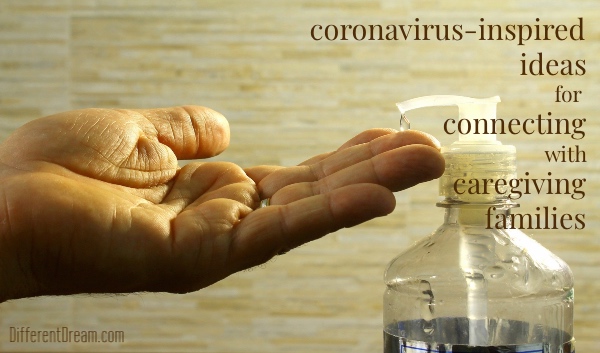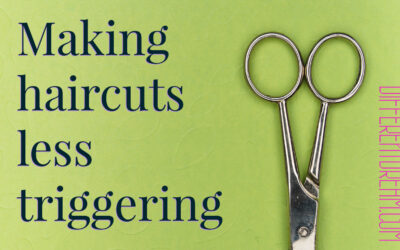Connecting with Caregiving Families: 6 Coronavirus-Inspired Ideas

Connecting with caregiving families is a challenge in the best of times. In this season of social distancing, connecting with families caring for children, spouses, or aging parents may feel impossible. But I can assure you–as someone who grew up with disabled father in the 1960s, kept a medically-fragile baby alive in the 1980s, and who is overseeing the care of a 91-year-old parent in 2020–that connecting with caregivers and their families is possible. These 7 ideas, inspired by the social distancing caused by the coronavirus, show that a mix of creativity and persistence can make connecting with caregiving families fun!
#1: Text, call, and FaceTime
Hearing from friends and families means the world to caregiving families. Texting is easiest, but also the furthest from face-to-face communication. A phone call takes time, but it’s so worth it to hear the voice of a living, breathing person. FaceTime may require some advance scheduling, but the caregivers you know will be delighted to hear your voice and see your face. An extra plus: not one of these 3 methods require 20 seconds of COVID-19 hand washing.
#2: Provide a meal
Call and offer to cook a meal or pick up carry out from a caregiver’s favorite restaurant. If you have more time than money, use the first option. If you have more money than time and want to support a local restaurant hit hard by coronavirus restrictions, use the second. In either case, check with the family about food restrictions or allergies before cooking or ordering. You and they will be glad you did.
To read the rest of this post, visit Jill Savage’s blog here.
Do you like what you see at DifferentDream.com? You can receive more great content by subscribing to the monthly Different Dream newsletter and signing up for the daily RSS feed delivered to your email inbox. You can sign up for both at the bottom of this page.
By Jolene
Jolene Philo is a published author, speaker, wife, and mother of a son with special needs.
Subscribe for Updates from Jolene
Related Posts
Caring for a Family Member in the Hospital
Caring for a family member in the hospital is never easy. Jolene explains what she has learned over the years.
How Happy Haircuts Happen
Guest blogger Mark Arnold explains how happy haircuts happen for his son who has sensory processing disorder (SPD).
10 Ways Families Impacted by Disabilities and Special Needs Can Enjoy Spring
Guest blogger Mark Arnold explains 10 ways families impacted by disabilities and special needs can enjoy spring.






0 Comments